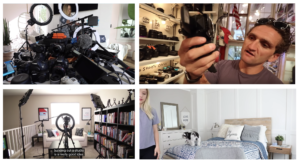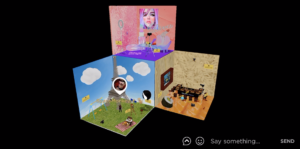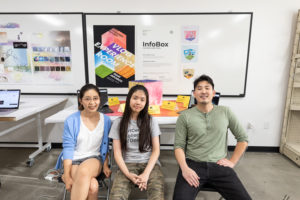This is part 5 of a 5-part blog post in which we spotlight 5 teams from an IMVU-sponsored project at ArtCenter College of Design. As summarized in this post, the question was posed to a group of cross-disciplinary art students, what would foster friendship and connection on the IMVU platform. Students were encouraged to explore the platform, learn to create rooms and content, and explore what type of “recipe” could be created that would influence connection between users and ultimately friendship.
InfoBox team is: Xun Liu, Shane Park, and May Chen
The InfoBox team proposes that there is a missing component of “social groups” in IMVU. By creating the groups that users can aspire to join, this can trigger like-minded conversation about the topic and inspire users to connect and even be friends. With the parallel between IMVU and real-world experiences, the team supposes that creating a marketing program where users can become real-life professions through experiencing education and then a test on a profession would be a recipe for success.

“We all looking for the way to escape from worries. I think escape is really important, but social interaction is important too. People are looking to connect with other people.”
Honestly, even before I decided to take this class, I have been created avatars with different platforms including IMVU either for my own identity or my favorite characters since a long time ago, and I always wonder how exactly the whole system of the avatars and social interactions like IMVU works. Besides, I had several courses and artworks that explored human nature and psychology, and those inputs lead to my interest of this studio, which provides the opportunity to us to keep exploring what do people really need to get from IMVU as an avatar-based social platform, and how to make our design effectively work in execution. — May Chen
Professions are special interests that users could learn about (in a room created for a particular profession) and then tested through an external (Google) form.
Learning can be done through staged experience.

Proposal: To inspire and educate users through role playing experiences to promote passion and growth.

The team did further research on the art of “Vlogging” – which is special interest video documentation/teaching to determine how to construct a room that could teach. Key components were:
- Immersive room to express the profession
- Separate areas where key elements of the profession can be explained
- Triggers control popup notes that teach

The team created a tri-level cube design for the room to teach 3 types of Vlogging skills

Team InfoBox

Some user-feedback during testing of the room
It’s really fascinating and terrific to see the users’ live reaction to the environment we created in IMVU’s platform. We see people roleplayed around the room, started chatting with each other, and some of them provided us a lot of helpful feedback including the arrangement and purposes of the furniture and so on. Compare to doing tons of research by googling and reading in the library, real time user testing is definitely more efficient and practical because all the advices come from our real user base. — May Chen
